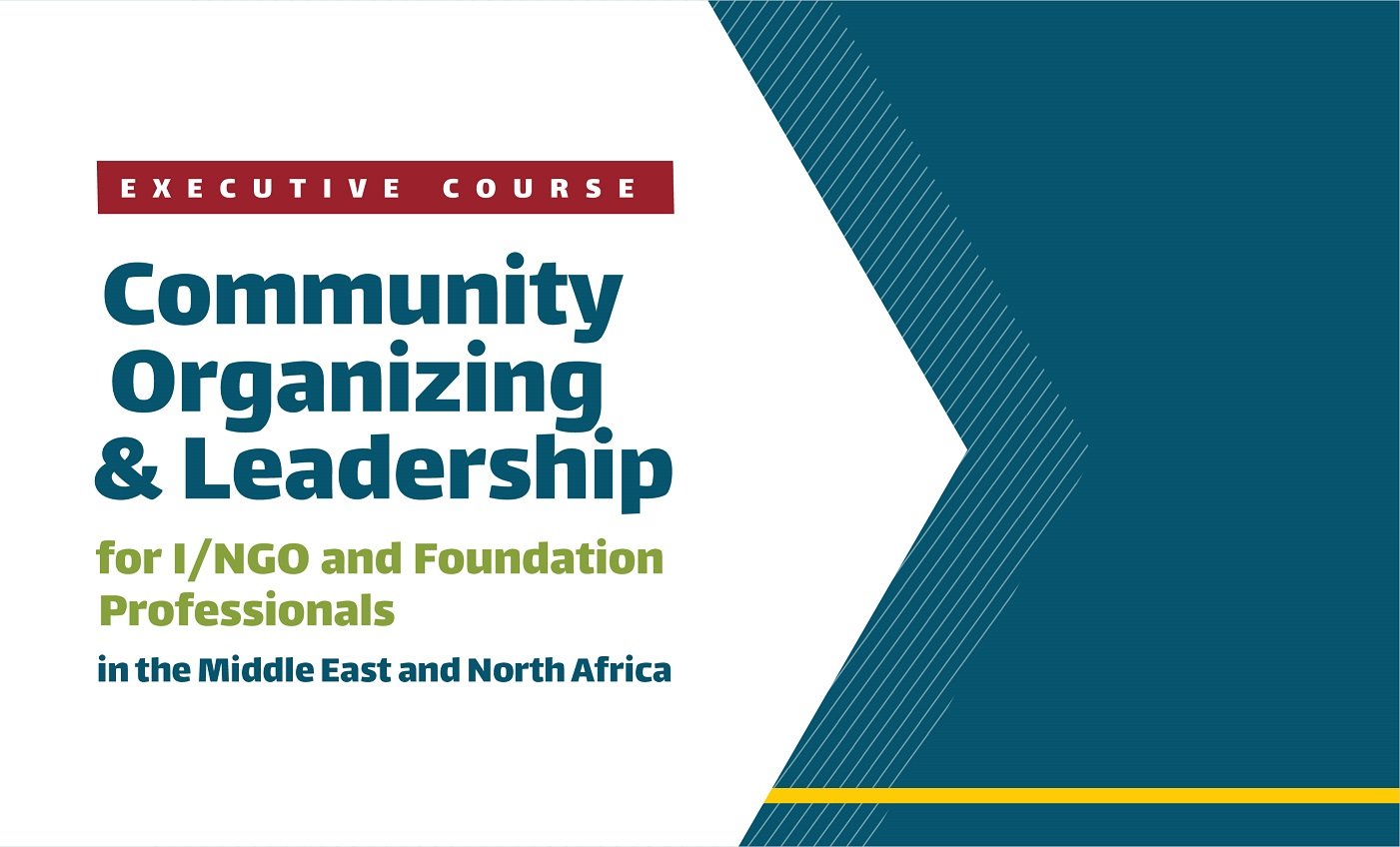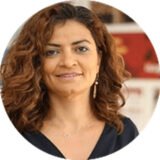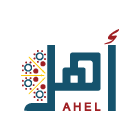
Register here
About The Executive Course
There are different ways to bring about change for justice and freedom. Which to follow depends on your understanding of success. Advocacy, mobilization, raising awareness, media action, strategic litigation? In this political context, is successful change one that brings about the different policy, practice, or decision maker we wanted? Or is it one that grows the power of certain organizations serving or representing the people/a community? Or is it one that grows the collective power of the people (the right holders) and their individual’s leadership to work together now and in the future? In this course we focus on power, people and change, and introduce community organizing as a way to achieve success on multiple levels. We will understand the political philosophy and theory behind it. Through studying different case studies, we will learn five campaigning and leadership practices that worked in bringing about change and returning the power to the people. We will relate leadership, organizing, and campaigns to social and political movements and analyze the degree to which organizations we belong to are enhancing people’s leadership of collective action and growing real movements? At the heart of this executive course is a conversation about values: our values through our stories, our shared values, the threats to some of them, and the action needed to honor values we hold dear in current times.
Pedagogy
The course is designed to engage the head, the heart, and the hands. It includes theoretical and experiential approaches to learning.
- Some of the assigned readings present theses on agency, leadership, organizing and movements.
- Others present case studies of campaigns and organizing experiences from different countries.
- The course solicits the stories of the participating students (their call to leadership)
- It also showcases stories of agency and action of organizers and leaders around us.
Finally through a simulation exercise, the students apply what they learned so as to organize a community led campaign around a shared value and a cause they are passionate about.
Level of effort:
There are five 2.5 hour weekly sessions – they are live on Zoom. Each session is preceded by two to three assigned readings / listening, and is followed by a 300 word reflection entry on a prompt. At the end of the course there is one assignment: a two page paper.
A pre-evaluation form and a post-evaluation form need to be completed.
Who is this course for?
The course is limited to 8-12 participants all working for the same mission even though they are in different organizations. The small size allows for deep discussions and small size working groups.
If you are currently working at an INGO or a foundation that funds projects and programmes that target local communities in the Middle East and North Africa, and are interested in learning about community organizing as a theory of change, then this course is for you.
This course is designed for mid to senior level international NGO and Foundation staff working on civic engagement, community empowerment, support to social movements, youth development, gender and women rights, people with disabilities rights, climate change, as well as social and economic justice in the MENA.
The graduates from the two runs of this programme in May and October 2023 included representatives from OSF, IM, KTK and Oxfam, WILPF, Asfari. They described the programme as “very strong”, “linked to issues on the ground and deals with them from a new angle”, “It contributes to the individual’s reconsideration of change and the link between the individual and the collective, taking into account the overlaps in between”, The modality, flexibility and firmness at the same time, the sequence of sessions and tutors”.
Learning Outcomes
At the end of this course the students will be able to:
-
-
- Define success in collective action for change in the current political context
- Understand the definition of leadership, community organizing and people led campaigns
- Review different approaches to change and through a power analysis prism analyze and differentiate them from each other.
- Learn the community organizing methodology, its practices and how it is applied in the field.
- Consider how their INGOs and Foundations can adapt their ways of working to enable more people power, community led campaigns and organizing, and de-NGOize the movement.
-
The Program
In this module, we examine the meaning of successful collective action in terms of people, power and change in our current context in the Middle East and North Africa. We learn about the three faces of power (Luke) and the three paradigms of change (Ganz). We investigate the meaning of leadership, the different approaches to pursuing change (Shutz & Sandy), and zoom in on community organizing as an approach in which the right holders assume leadership of their communities and resources for specific change. In the course of this module, we define the meaning of the words campaign and social movement (Diani).
-
- Assigned Reading:
-
- Ganz, M. (2010) Leading Change: Leadership, Organization, and Social Movements
- Schutz, A. and Sandy, M. (2011) Collective Action for Social Change
- Optional:
- Diani, M. (1992) The Concept of Social Movement
- Lukes, S. (2005) Power: A Radical View. 2nd Edition
-
- Reflection prompt: 300 words.
- Assigned Reading:
In this module, we see how the five leadership practices of community organizing were used by right holders to achieve sought change and build people power through two campaigns. We look at how a group of private school women teachers build individual and collective leadership to protect their labor rights? We also look at the role civic society organizations played in building the leadership and the power of the people. And how did a people-led campaign form and expand to break child engagements for three years and is still going?
-
- Assigned Reading & listening:
-
- Haj Ahmad, N. (2016) Stand up With The Teacher Campaign: An Experience of Collective Voice- Case Study & Podcast (Arabic) Athar- Qom
- Aiello , Emilia (2022), Public Narrative and Its use in the Stand up with the Teachers campaign – Jordan.
- Abujabara, J. (2022) Let Me Keep My Childhood- Case Study & Podcast (Arabic ) Athar- La Tkabrona.
- optional
- Winig, L. and Zeine, R. (2016) 6 Minutes: Community Organizing in Amman, Jordan- Case Study
-
- Reflection prompt: 300 words.
- Assigned Reading & listening:
In this module, we look at the two ways of understanding the world and motivating action (Bruner). We examine how developing and telling one’s public narrative can be done in a way that builds leadership (Macadams), builds community and mobilizes action (Madox). We develop our own narrative around leadership in three stories (self, us and now) and in each we highlight the challenge that builds urgency, the choice that builds agency and the outcome that builds hope (Ganz). In this module, and through our own stories, we focus on the values that call us to action and bring us together and how they relate to our shared mission.
-
- Assigned Reading:
-
- McAdams, D. (2006) The Redemptive Self.
- Ganz, M. (2011) Public Narrative, Collective Action, and Power.
-
- Story viewing: five story videos from different backgrounds
- Reflection prompt: 300 words.
- Assigned Reading:
In this module, we are all leaders and we are simulating a group of people who came together to act collectively for a cause that unites them. The cohort is now the core team of a campaign to be launched. They are coming together now for two and a half hours, with the facilitation of an organizing coach from Ahel, to talk strategy, leadership structure, narrative and action. By the end of the session, they have a vivid imagination of how organizing can be put to use for the students’ causes and rights.
-
- Assigned Reading:
-
- Depending on the cause chosen for this simulation exercise, two readings will be assigned.
-
- Reflection prompt: 300 words.
- Assigned Reading:
In this final module, we relate what we learned about social movements, community organizing, campaigns, and people power to our work in the world of INGOs and Foundations. We discuss how services are bad for the people (McKnight) and how the struggle for rights can not be NGOIzed (Jad). We reflect on how our organizations’ work is impacting social movements, growing people power, and achieving real change and how that could be enhanced with community organizing. How does or should our role change if we know the political aspirations of the organizations and movements supported? and how our relationship to organizations may dilute the true lines of accountability.
-
- Assigned Reading:
-
- McKnight, J. (1991) Services Are Bad for People
- Jad, I. (2003) The NGOization of the Arab Women’s Movements
-
- Assigned Reading:
Final Assignment
A two page essay is to be submitted one week after the last session. Two prompts will be provided for you to choose from. The objective to reflect on all of the five modules.
Certificate
Once all assignments are completed, a certificate of completion is provided from Ahel, barring two or more absences from the course.
Course Rates
Course rate 800 USD (570 JODs).
About The Team

Lead Teacher | Nisreen Haj Ahmad | nisreen@ahel.org
Nisreen Haj Ahmad is the executive director and co-founder of Ahel for Community Organizing in the Middle East. Ahel.org is a nonprofit that coaches grassroots campaigns and trains leaders, activists and active citizens on organizing collective action for the change they pursue, always building people power. Nisreen is committed to creating and facilitating learning and solidarity spaces that sustain leaders and activists globally. In 2012 and 2014, she coordinated the Leading Change Global Gatherings, bringing together more than a hundred organizers from around the world in Boston and Belgrade respectively. Nisreen is an advisory board member of Beautiful Rising and Rawa Fund. Trained as a lawyer, Nisreen obtained a law degree from the University of Jordan (1995), Masters in Law from Edinburgh University (1997), Masters in Public Policy from Harvard Kennedy School (2007). In 2017 she was a research fellow at the Ash Center at Harvard Kennedy School where with Professor Marshall Ganz, she taught “Social Movements Today: Critical Questions for Critical Times”. She is lead lecturer of the Arabic Online 4 month course “Leadership and Organizing Collective Action for Change”. She has produced several publications, including a documentation of Stand with the Teachers Campaign for fair pay, published by the International Labour Organization, and her work is the subject of a Harvard case study. Before entering the world of community leadership and organizing in 2007, Nisreen spent 6 years working as a legal advisor for the Palestinian negotiations team in the peace talks with Israel.

Program Manager | Tamara Khalaf | tamara@ahel.org
Tamara Khalaf is the Director of Teaching and Learning at Ahel. She has over 12 year’s experience in project management and content development, with a focus on e-learning programs and projects. Before joining Ahel, she worked at Edraak, an online course platform that offered courses to learners in the MENA region as program manager for over 5 years. At Edraak, she launched or co-launched several programs targeting job seekers, youth, and K-12.
Tamara has also collaborated on projects with other private sector companies and non-profit organizations to design and create strategic learning products and programs, both online and offline. Before entering the world of e-learning.
Between the years 2013 – 2017, Tamara volunteered with Basmitak Hat’allim (Saib NGO), creating livelihood projects for the Gaza Refugee Camp in Jerash and later forming partnerships and organizing its member and volunteer teams. She was also a member of BDS Jordan back in 2014.
Tamara speaks Arabic, English and French fluently as she received her bachelors’ degree in Arts (French Language and Literature) in 2010, from the University of Jordan.
About Ahel
Ahel Organization supports those pursuing change in the Arab world in organizing their power and leadership to achieve justice in their causes. We do that in three ways. We accompany and coach campaigns in their collective action. We teach participatory leadership and community organizing practices to leaders online and offline. And we connect leaders in the Arab world with each other. Our success is when leaders and campaigns build their own people’s power and when they win the change they seek for freedom, justice and equality. To date, Ahel coached more than 37 campaigns in the region and taught over 7 thousand people organizing and leadership.
In its new strategy (2023-2028), Ahel decided to also focus on supporting national or local community based centers and civic organizations who are interested in enabling their constituency’s collective leadership and organizing capacity. Ahel will teach the organizations community organizing methodology so that they build shared leadership in their communities, and so that their communities decide the change they need and lead collective action and campaigns with decreasing dependency on the organizations. To that end, Ahel will also build the capacity of some of their team members to be organizers and coaches of community led campaigns.
